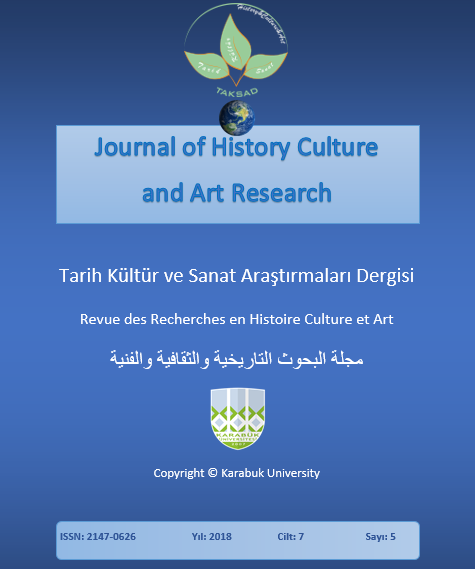İdeolojinin Edebi Eserlerde Üslûba Etkisi / The Effects of Ideology on the Literary Style in Literary Works
DOI:
https://doi.org/10.7596/taksad.v7i5.1884Keywords:
Anlam merkezlilik, Dil-kültür ilişkisi, Dil-düşünce analizi teorisi, Üslup incelemesi, Meaning-centered approach, Realtion of language and culture, the theory of language -thought analysis, Literary style analysis.Abstract
Abstract
The language spoken by societies throughout their history reveals the reflections about their life style. Therefore, language and cultural interaction provides important clues to analyze the sociological structure of societies. The literary style of an author is influenced by his/her ideology which is shaped by the period, the life of the society and the personal life of the author him/herself. Therefore, it can be said that the literary style is a conversion of ideas into literary works. This study of literary style is investigated within the scope of Structuralism (Saussure, 1949) and the Transfomational-generative grammar (Chomsky, 1964). These two theories are not sufficient enough to analyze and explain the Turkish language system. The critics of these is studied depending on ‘the theory of language-thought analysis’ (Avcı, 2012). For this purpose, the sentences in the ‘Grev’ novel by Orhan Kemal were analyzed basically on meaning-centered approach, explored the factors that influence the literary style and tried to grasp the author’s mentality. The novel is chosen specially for its being a social novel. Therefore the sentences in the novel ‘Grev’ were analyzed on the basis of meaning-centered approach. The data gathered by categorical content analysis were interpreted. In order to define the features that effects the literary style, the content analysis method was used and the data compared. In this research, when analyzing the language in use and literary style of the author in the novel, it is observed that the lack of deep structure of the novel is striking and it is a kind of reproducing the foreign languages. The study concluded that the author’s literary style and basic mentality is not compatible with the society that he/she lives in, he/she leads to corruption of the syntax of the language and lost the touch with the realities of the Turkish society in the novel, as well.
Öz
Toplumların tarihleri boyunca konuştuğu dil, yaşama şekilleri hakkında bilgi verir. Toplumların sosyolojik yapısını anlamak, düşünce sistemini algılayabilmek için kültür ve dil etkileşimi önemli sonuçlar verir. Bir yazarın üslûbu, sahip olduğu ideolojisinin tarihe özgü döneminden, toplum hayatından ve kişisel yaşantısından etkilenir. Dolayısıyla üslûp, fikirlerin edebi metin haline dönüşmüş şeklidir diyebiliriz. Bu üslup incelemesi Yapısalcı ekol (Saussure, 1949) ve Üretimsel dönüşümlü ekol (Chomsky, 1964) bağlamında yapılacaktır. Bu ekoller Türkçeyi açıklamakta ve incelemekte yetersiz kalmaktadır. Bunların eleştirisi “dil-düşünce analizi teorisi” (Avcı, 2012)’ne göre yapılacaktır. Bu çalışmanın amacını; Orhan Kemal’in Grev romanındaki cümlelerini anlam merkezli olarak incelemek, üslûba etki eden unsurları araştırmak ve yazarın düşünce yapısı hakkında fikir edinmek oluşturur. Bu roman toplumsal bir roman özelliği gösterdiği için seçilmiştir. Bu amaç için, Grev romanındaki cümleler anlam merkezli olarak incelenmiş, kategorik içerik analizi yapılarak somut veriler elde edilmiş ve yorumlanmıştır. Üslûba etki eden unsurları belirlemek amacı için de doküman incelemesi yöntemi kullanılmış ve karşılaştırma yapılmıştır. Çalışmada, yazarın dil kullanımı ve üslûbu incelendiğinde derin yapıdaki eksiklikleri dikkat çekmekte, yabancı dillere öykündüğü görülmektedir. Yazarın içinde bulunduğu toplumun dile özgü özelliklerine ve fikrî temellerine bağlı kalmadığı, söz diziminde bozulmalara yol açtığı, Türk toplumuna ve gerçeklerine uzak olduğu sonucuna ulaşılmıştır.
References
Avcı, Y. (2012). Yabancı dil olarak Türkçe öğretiminde dil-düşünce analizi teorisi. Manas Sosyal Araştırmalar Dergisi, 1(3). 1-15.
Barın, E. (2005). Yabancılara Türkçe öğretiminde ilkeler. Hütad, (1). 19-30.
Chomsky, N. (1964). Current Issues in Linguistic Theory, Katz/Fodor.
Güvenç, B. (1994). İnsan ve Kültür. (6. baskı), İstanbul: Remzi Kitabevi.
Kana, F. (2010). Ziya Paşa’ya göre edebiyat ve insan eğitimi. (Pamukkale Üniversitesi, Yüksek lisans tezi).
Kartarı, A. (2006). Farklılarla yaşamak kültürlerarası iletişim. Ankara: Ürün Yayınları.
Kemal, O. (1954). Grev. Ankara: Seçilmiş hikâyeler dergisi kitapları.
Koçdemir, K. (1999). Küreselleşme ve Türk kültürü. Kök Araştırmalar Dergisi, 1, 5-20.
Madge, J. (1965). The Tools of Science an Analytical Description of Social Scince Techniques. Anchor Books Doubleday and Comp.
Marks, K. (2003). Kapital. Eriş yayınları. C: I. Erişim: Eylül 2018. https://www.marxists.org/turkce/m-e/kapital/kapital1.pdf
Marks, K. (2003). Kapital. Eriş yayınları. C: II. Erişim: Eylül 2018. https://www.marxists.org/turkce/m-e/kapital/kapital2.pdf
Marx, K. (1975). Ücret fiyat ve kâr ücretli emek ve sermaye. Ankara: Sol Yayınları.
Özbek, A. (2010). Fatih-Harbiye ve Yaban romanlarında cümlelerin anlam merkezli incelenerek üslûp özelliklerinin karşılaştırılması ve eğitime katkısı. (Çanakkale Onsekiz Mart Üniversitesi, Yüksek lisans tezi.)
Saussure, F. (1995). Cours de Linguistique Generale, Paris.
Tural, S. K. (1991). Zamanın elinden tutmak. Ankara: Ecdad Yayınları. s.27.
Yeke, E. (2010). Türk dili ve edebiyatı derslerinde metin çözümlemesinde Hüseyin Nihal Atsız'ın tarihi romanlarına üslûp bilim açısından yaklaşım. (Çanakkale Onsekiz Mart Üniversitesi, Yüksek lisans tezi.)
Downloads
Published
How to Cite
Issue
Section
License
All papers licensed under Creative Commons 4.0 CC-BY.- Share — copy and redistribute the material in any medium or format
- Adapt — remix, transform, and build upon the material for any purpose, even commercially.
Under the following terms:
Attribution — You must give appropriate credit, provide a link to the license, and indicate if changes were made. You may do so in any reasonable manner, but not in any way that suggests the licensor endorses you or your use.
- No additional restrictions — You may not apply legal terms or technological measures that legally restrict others from doing anything the license permits.







